汉语成语翻译
成语大全及翻译

成语大全及翻译成语是指用简洁、形象的词语组成的固定搭配,具有一定的文化内涵和特定的语境义。
它是中国汉语中的一种特殊表达方式,富有浓厚的文化底蕴和哲学思想。
下面是一些常用的成语及其翻译,以供参考。
1. 好事多磨(Good things are hard to come by)意义:好事往往遇到各种困难和阻碍。
例句:他最近遇到了一些麻烦,这真是好事多磨。
2. 一鸣惊人(To make a surprising success)意义:指一时突然出众或有重大成就。
例句:他在比赛中一鸣惊人,赢得了冠军。
3. 亡羊补牢(Mend the fold after losing the sheep)意义:指事情出了问题后补救措施。
例句:虽然出了一些错误,但我们可以亡羊补牢。
4. 杯弓蛇影(Groundless fears)意义:形容人多疑,容易受骗。
例句:他老是杯弓蛇影,不相信别人的善意。
5. 功亏一篑(To fail to complete a task at the last moment)意义:形容做事情快成功时却失败了。
例句:他最后失败了,功亏一篑。
6. 跳梁小丑(A buffoon)意义:指某人一时得势,但并没真实实力。
例句:他是个跳梁小丑,实际并不具备什么才能。
7. 自相矛盾(Self-contradictory)意义:指自己的话或行为自相矛盾。
例句:他说的话自相矛盾,让人难以理解。
8. 背道而驰(To run counter to)意义:指行动和目标相反。
例句:他的做法背道而驰,没有考虑到大局。
9. 口是心非(To say one thing but mean another)意义:指嘴里说的和心里想的不一样。
例句:他口是心非,没有实际行动。
10. 守株待兔(To wait idly for opportunities)意义:指人不去努力争取而等待机会。
例句:守株待兔是没有出息的做法。
以上是常用的一些成语及其翻译,每个成语都有其独特的意义和文化背景。
成语大全四字成语及翻译
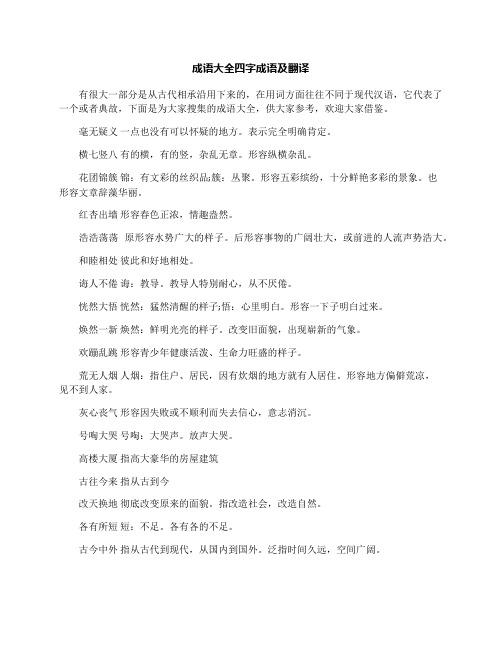
成语大全四字成语及翻译有很大一部分是从古代相承沿用下来的,在用词方面往往不同于现代汉语,它代表了一个或者典故,下面是为大家搜集的成语大全,供大家参考,欢迎大家借鉴。
毫无疑义一点也没有可以怀疑的地方。
表示完全明确肯定。
横七竖八有的横,有的竖,杂乱无章。
形容纵横杂乱。
花团锦簇锦:有文彩的丝织品;簇:丛聚。
形容五彩缤纷,十分鲜艳多彩的景象。
也形容文章辞藻华丽。
红杏出墙形容春色正浓,情趣盎然。
浩浩荡荡原形容水势广大的样子。
后形容事物的广阔壮大,或前进的人流声势浩大。
和睦相处彼此和好地相处。
诲人不倦诲:教导。
教导人特别耐心,从不厌倦。
恍然大悟恍然:猛然清醒的样子;悟:心里明白。
形容一下子明白过来。
焕然一新焕然:鲜明光亮的样子。
改变旧面貌,出现崭新的气象。
欢蹦乱跳形容青少年健康活泼、生命力旺盛的样子。
荒无人烟人烟:指住户、居民,因有炊烟的地方就有人居住。
形容地方偏僻荒凉,见不到人家。
灰心丧气形容因失败或不顺利而失去信心,意志消沉。
号啕大哭号啕:大哭声。
放声大哭。
高楼大厦指高大豪华的房屋建筑古往今来指从古到今改天换地彻底改变原来的面貌。
指改造社会,改造自然。
各有所短短:不足。
各有各的不足。
古今中外指从古代到现代,从国内到国外。
泛指时间久远,空间广阔。
瓜熟蒂落蒂:花或瓜果跟枝茎相连的部分。
瓜熟了,瓜蒂自然脱落。
指时机一旦成熟,事情自然成功。
攻无不克克:攻下。
没有攻占不下来的。
形容力量无比强大。
光彩夺目夺目:耀眼。
形容鲜艳耀眼。
也用来形容某些艺术作品和艺术形象的极高成就。
光阴似箭光阴:时间。
时间如箭,迅速流逝。
形容时间过得极快。
骨瘦如柴形容消瘦到极点。
管中窥豹从竹管的小孔里看豹,只看到豹身上的一块斑纹。
比喻只看到事物的一部分,指所见不全面或略有所得。
滚瓜烂熟形容读书或背书流利纯熟。
感激不尽感激的心情没有穷尽。
形容非常感激。
高头大马指体形高大的马。
也比喻人的体形高大。
各色各样犹言各式各样。
各式各样谓多种不同的式样、种类或方式。
四字成语大全及解释【五篇】

【导语】成语在古代汉语与现代汉语的传承上占有重要的地位,它是汉语词汇系统中重要⽽⼜极富特⾊的组成部分。
下⾯是⽆忧考分享的四字成语⼤全及解释【五篇】。
欢迎阅读参考!1.四字成语⼤全及解释 1、郑重其事 郑重:审慎,严肃认真。
形容说话做事时态度⾮常严肃认真。
2、辗转反侧 辗转:翻来复去;反侧:反复。
翻来复去,睡不着觉。
形容⼼⾥有所思念或⼼事重重。
3、真⼼诚意 ⼼意真实诚恳,没有虚假。
4、众⽬睽睽 睽睽:张⽬注视的样⼦。
许多⼈争着眼睛看着。
指在⼴⼤群众注视之下。
5、沾沾⾃喜 形容⾃以为不错⽽得意的样⼦。
6、张皇失措 张皇:慌张;失措:举⽌失去常态。
惊慌得不知怎么办才好。
7、置之死地 有意使⼈处于⽆法⽣存下去的境地。
8、在劫难逃 旧时迷信的⼈认为命⾥注定要遭受的灾难是⽆法逃脱的。
现有时也⽤来指某种灾害不可避免。
9、众说纷纭 纷纭:多⽽姑乱。
⼈多嘴杂,议论纷纷。
10、字⾥⾏间 指⽂章的某种思想感情没有直接说出⽽是通过全篇或全段⽂字透露出来。
11、⾃欺欺⼈ 欺骗⾃⼰,也欺骗别⼈。
12、⾃以为是 是:对。
总以为⾃⼰是对的。
形容主观,不虚⼼。
13、知⼈之明 能看出⼈的品⾏才能的眼⼒。
14、⾃出⼼裁 ⼼裁:⼼中的设计、筹划。
出于⾃⼰的创造。
指不抄袭、模仿别⼈。
15、⾄亲⾻⾁ 关系最近的亲⼈。
16、周⽽复始 周:环绕⼀圈;复:⼜,再。
转了⼀圈⼜⼀圈,不断循环。
17、正⼈君⼦ 旧时指品⾏端正的⼈。
现多作讽刺的⽤法,指假装正经的⼈。
18、转弯抹⾓ 抹⾓:挨着墙⾓绕⾛。
沿着弯弯曲曲的路⾛。
⽐喻说话绕弯,不直截了当。
2.四字成语⼤全及解释 1.万马奔腾 形容声势浩⼤,进展迅速,⽓氛热烈。
2.六畜兴旺 六蓄指⽜、马、⽺、鸡、⽝、⾗。
⽐喻养殖业兴旺发达。
3.五⾕丰登 五⾕指稻、⿉(⼩⽶)、稷(⾼粱)、麦、菽(⾖),泛指农作物。
4.国泰民安 国家太平,⼈民⽣活安定。
5.⼈寿年丰 ⼈健康,年成好,形容⽣活安乐美好。
常用汉语成语英文翻译

1.爱屋及乌Love me, love my dog。
2.百闻不如一见Seeing is believing。
4.笨鸟先飞A slow sparrow shouldmake an early start。
5.不眠之夜white night7.不遗余力spare no effort; goall out; do one’s best8.不打不成交No discord, noconcord。
9.拆东墙补西墙rob Peter to pay Paul18.和气生财Harmony brings wealth。
19.活到老学到老One is never too old to learn。
20.既往不咎let bygones be bygones22.金玉满堂Treasures fill the home。
23.脚踏实地be down-to-earth24.脚踩两只船sit on the fence26.老生常谈陈词滥调cut and dried, cliché27.礼尚往来Courtesy calls for reciprocity。
28.留得青山在不怕没柴烧Where there is life, there is hope。
29.马到成功achieve immediate victory; win instant success30.名利双收gain in both fame and wealth31.以貌取人Judge a book by its cover.3.比上不足比下有余worse offthan some, better off than many;to fall short of the best, but be better thanthe worst。
6.不以物喜不以己悲not pleasedby external gains, not saddened by personnal losses10.辞旧迎新bidfarewell to the old and usher in the new;ring out the old year and ring in thenew11.大事化小小事化了try firstto make their mistake sound less serious and then to reduce it to nothing atall12.大开眼界open one’s eyes; broaden one’s horizon; be an eye-opener13.国泰民安The countryflourishes and people live in peace14.过犹不及going toofar is as bad as not going far enough; beyond is as wrong as falling short; toomuch is as bad as too little15.功夫不负有心人Everythingcomes to him who waits。
汉语成语翻译

(7).谚语俗语 谚语俗语 有些成语是群众口头中使用的谚语或俗语。 A. 亡羊补牢 Mend the fold after the sheep is stolen. B. 敝帚千金 cherish an old broom as if it were a thousand pieces of gold—cherish a possession of little value.
2) Literal translation with annotations直译加注有些习 直译加注
语含有比喻意义、象征意义或是历史典故等) 语含有比喻意义、象征意义或是历史典故等
a.木已成舟:The wood is already made into a boat—what’s done is done. b. 杞人忧天: Like the man of Chi who was haunted by the fear that the sky might fall—unnecessary anxiety. c . 朝秦暮楚: Serve the State of Qin in the morning and the State of Chu in the evening—playing fast and loose (quick to switch sides)
(6)人民群众用过的精炼词组 人民群众用过的精炼词组
成语中绝大部分是人民群众创造的,其中有一些 具有浓厚的口语色彩和生活气息。
A. 大海捞针 look for a needle in a bunch of haystack B. 指桑骂槐 point at the mulberry and abuse the locust—point at one but abuse another (literal +annotation) make oblique accusations (free)
四字成语大全1000个及解释
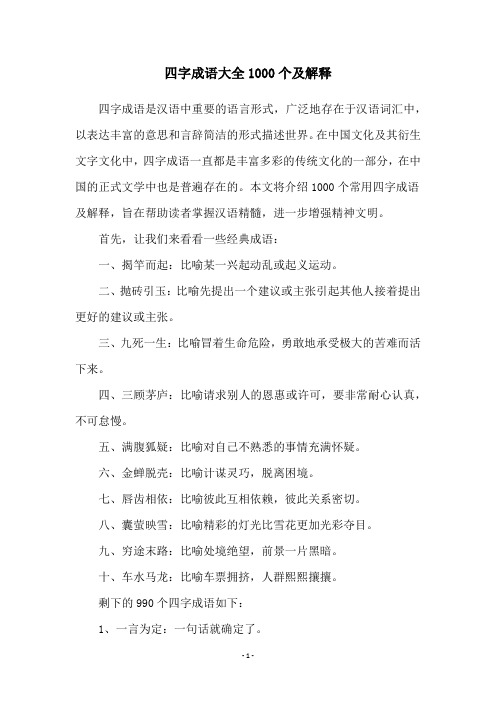
四字成语大全1000个及解释四字成语是汉语中重要的语言形式,广泛地存在于汉语词汇中,以表达丰富的意思和言辞简洁的形式描述世界。
在中国文化及其衍生文字文化中,四字成语一直都是丰富多彩的传统文化的一部分,在中国的正式文学中也是普遍存在的。
本文将介绍1000个常用四字成语及解释,旨在帮助读者掌握汉语精髓,进一步增强精神文明。
首先,让我们来看看一些经典成语:一、揭竿而起:比喻某一兴起动乱或起义运动。
二、抛砖引玉:比喻先提出一个建议或主张引起其他人接着提出更好的建议或主张。
三、九死一生:比喻冒着生命危险,勇敢地承受极大的苦难而活下来。
四、三顾茅庐:比喻请求别人的恩惠或许可,要非常耐心认真,不可怠慢。
五、满腹狐疑:比喻对自己不熟悉的事情充满怀疑。
六、金蝉脱壳:比喻计谋灵巧,脱离困境。
七、唇齿相依:比喻彼此互相依赖,彼此关系密切。
八、囊萤映雪:比喻精彩的灯光比雪花更加光彩夺目。
九、穷途末路:比喻处境绝望,前景一片黑暗。
十、车水马龙:比喻车票拥挤,人群熙熙攘攘。
剩下的990个四字成语如下:1、一言为定:一句话就确定了。
2、无中生有:毫无根据就凭空想象。
3、患难之交:指经历困境才知晓真正的朋友。
4、面面俱到:全方位准备,处处妥善。
5、脱颖而出:表现突出,鹤立鸡群。
6、才高八斗:才华横溢,博涉大江。
7、谦受益:认可他人优点,谦虚求索,自身受益。
8、囚禁自由:比喻限制自由,让人失去自由。
9、反客为主:指原来是客人,后来变成了主人。
10、百家争鸣:比喻多方面的讨论。
11、嫁祸他人:把自身的错误推给别人。
12、锦上添花:使原来的事物变得更加完美。
13、无所不能:指在任何事情上都能胜任。
14、心服口服:完全满意、欣然服从。
15、催人奋进:激励别人更加努力奋斗。
16、恩将仇报:仇恨不会消失,反倒更加深刻。
17、虎头蛇尾:比喻某事物开始的时候表现出色,到最后却难言失败。
18、投机倒把:把非主要的角色扮演为主要的角色。
19、情同手足:表现出兄弟般的相互信任和支持。
汉语成语英译

文是一项既有挑战性又有趣味性的任务。
在这里,我将为您介绍一些常用的汉语成语,并提供它们的英文翻译及相应的解释。
### 1. 亡羊补牢,犹未为晚。
- **英文翻译:** It's never too late to mend the fold after the sheep are lost.- **解释:** 意指在问题发生后采取措施,即便为时已晚,也要努力弥补错误。
### 2. 卧薪尝胆- **英文翻译:** Sleep on sticks and taste gall.- **解释:** 指为了达到目的,付出艰苦努力,经历各种磨难。
### 3. 画蛇添足- **英文翻译:** Draw a snake and add feet to it.- **解释:** 形容多此一举,做了不必要的事情。
### 4. 杯弓蛇影- **英文翻译:** A bow's shadow looks like a snake.- **解释:** 形容因过于紧张或过于敏感而产生的杞人忧天的心理。
### 5. 班门弄斧- **英文翻译:** Showing an axe before Lu Ban's door.- **解释:** 形容对行家炫耀本领,有点画蛇添足的意味。
### 6. 龙飞凤舞- **英文翻译:** Dragons soaring and phoenixes dancing.- **解释:** 形容文采华美,书法优美,也用来形容喜庆繁荣的景象。
### 7. 杀鸡取卵- **英文翻译:** Killing the chicken to get the eggs.- **解释:** 形容因贪小失大的行为而导致损失。
### 8. 千里之堤,溃于蚁穴- **英文翻译:** A thousand-li dike collapses because of an ant hole.- **解释:** 比喻大事败于微小的缺点、漏洞。
100个成语的汉语翻译(中英文)
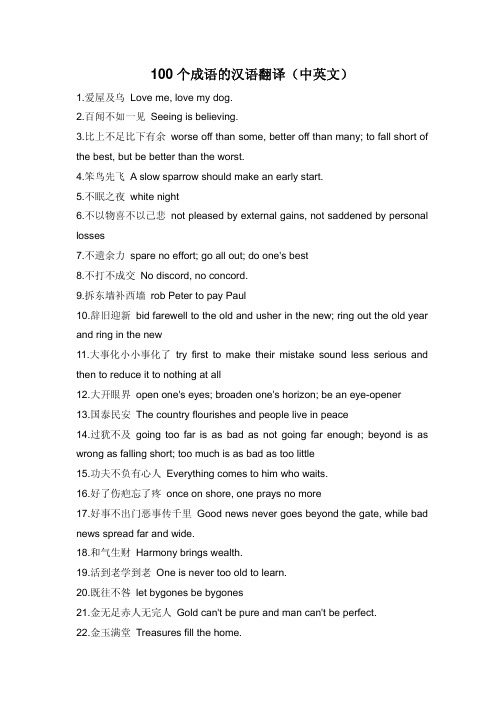
100个成语的汉语翻译(中英文)1.爱屋及乌Love me, love my dog.2.百闻不如一见Seeing is believing.3.比上不足比下有余worse off than some, better off than many; to fall short of the best, but be better than the worst.4.笨鸟先飞A slow sparrow should make an early start.5.不眠之夜 white night6.不以物喜不以己悲not pleased by external gains, not saddened by personal losses7.不遗余力spare no effort; go all out; do one's best8.不打不成交No discord, no concord.9.拆东墙补西墙rob Peter to pay Paul10.辞旧迎新bid farewell to the old and usher in the new; ring out the old year and ring in the new11.大事化小小事化了 try first to make their mistake sound less serious and then to reduce it to nothing at all12.大开眼界open one's eyes; broaden one's horizon; be an eye-opener13.国泰民安The country flourishes and people live in peace14.过犹不及 going too far is as bad as not going far enough; beyond is as wrong as falling short; too much is as bad as too little15.功夫不负有心人Everything comes to him who waits.16.好了伤疤忘了疼once on shore, one prays no more17.好事不出门恶事传千里Good news never goes beyond the gate, while bad news spread far and wide.18.和气生财Harmony brings wealth.19.活到老学到老One is never too old to learn.20.既往不咎let bygones be bygones21.金无足赤人无完人Gold can't be pure and man can't be perfect.22.金玉满堂Treasures fill the home.23.脚踏实地 be down-to-earth24.脚踩两只船sit on the fence25.君子之交淡如水the friendship between gentlemen is as pure as crystal; a hedge between keeps friendship green26.老生常谈陈词滥调cut and dried, cliché27.礼尚往来Courtesy calls for reciprocity.28.留得青山在不怕没柴烧Where there is life, there is hope.29.马到成功achieve immediate victory; win instant success30.名利双收gain in both fame and wealth31.茅塞顿开be suddenly enlightened32.没有规矩不成方圆 Nothing can be accomplished without norms or standards.33.每逢佳节倍思亲 On festive occasions more than ever one thinks of one's dear ones far away. It is on the festival occasions when one misses his dear most.34.谋事在人成事在天The planning lies with man, the outcome with Heaven. Man proposes, God disposes.35.弄巧成拙be too smart by half; Cunning outwits itself36.拿手好戏 masterpiece37.赔了夫人又折兵throw good money after bad38.抛砖引玉 a modest spur to induce others to come forward with valuable contributions; throw a sprat to catch a whale39.破釜沉舟cut off all means of retreat;burn one‘s own way of retreat and be determined to fight to the end40.抢得先机take the preemptive opportunities41.巧妇难为无米之炊 If you have no hand you can't make a fist. One can't make bricks without straw.42.千里之行始于足下 a thousand-li journey begins with the first step--the highest eminence is to be gained step by step43.前事不忘后事之师 Past experience, if not forgotten, is a guide for the future.44.前人栽树后人乘凉One generation plants the trees in whose shade another generation rests. One sows and another reaps.45.前怕狼后怕虎 fear the wolf in front and the tiger behind hesitate in doing something46.强龙难压地头蛇Even a dragon (from the outside) finds it hard to control a snake in its old haunt - Powerful outsiders can hardly afford to neglect local bullies.47.强强联手 win-win co-operation48.瑞雪兆丰年A timely snow promises a good harvest.49.人之初性本善Man's nature at birth is good.50.人逢喜事精神爽Joy puts heart into a man.51.人海战术 huge-crowd strategy52.世上无难事只要肯攀登Where there is a will, there is a way.53.世外桃源a fictitious land of peace away from the turmoil of the world;54.死而后已until my heart stops beating55.岁岁平安Peace all year round.56.上有天堂下有苏杭 Just as there is paradise in heaven, ther are Suzhou and Hangzhou on earth.57.塞翁失马焉知非福Misfortune may be an actual blessing.58.三十而立A man should be independent at the age of thirty. At thirty, a man should be able to think for himself.59.升级换代updating and upgrading (of products)60.四十不惑Life begins at forty.61.谁言寸草心报得三春晖 Such kindness of warm sun, can't be repaid by grass.62.水涨船高When the river rises, the boat floats high.63.时不我待Time and tide wait for no man.64.杀鸡用牛刀break a butterfly on the wheel65.实事求是seek truth from facts; be practical and realistic; be true to facts66.说曹操,曹操到Talk of the devil and he comes.67.实话实说speak the plain truth; call a spade a spade; tell it as it is68.实践是检验真理的唯一标准Practice is the sole criterion for testing truth.69.山不在高,有仙则名"No matter how high the mountain is, its name will spread far and wide if there is a fairy; "70.韬光养晦hide one's capacities and bide one's time71.糖衣炮弹sugar-coated bullets72.天有不测风云Anything unexpected may happen. a bolt from the blue73.团结就是力量Unity is strength.74.“跳进黄河洗不清”"eve if one jumped into the Yellow River, one can not wash oneself clean--there's nothing one can do to clear one's name "75.歪风邪气unhealthy practices and evil phenomena76.物以类聚,人以群分Birds of a feather flock together.77.往事如风"The past has vanished (from memory) like wind.; What in past, is past."78.望子成龙hold high hopes for one's child79.屋漏又逢连阴雨Misfortunes never come singly. When it rains it pours.80.文韬武略military expertise; military strategy81.唯利是图draw water to one's mill82.无源之水,无本之木water without a source, and a tree without roots83.无中生有make create something out of nothing84.无风不起浪There are no waves without wind. There's no smoke without fire.85.徇私枉法bend the law for the benefit of relatives or friends86.新官上任三把火a new broom sweeps clean87.虚心使人进步,骄傲使人落后Modesty helps one go forward, whereas conceit makes one lag behind.88.蓄势而发accumulate strength for a take-off89.心想事成May all your wish come true90.心照不宣have a tacit understanding; give tacit consent; tacit understanding91.先入为主First impressions are firmly entrenched.92.先下手为强catch the ball before the bound93.像热锅上的蚂蚁like an ant on a hot pan94.现身说法warn people by taking oneself as an example95.息事宁人pour oil on troubled waters96.喜忧参半mingled hope and fear97.循序渐进step by step98.一路平安,一路顺风speed somebody on their way; speed the parting guest99.严以律己,宽以待人be strict with oneself and lenient towards others100.鱼米之乡a land of milk and honey101.有情人终成眷属"Jack shall have Jill, all shall be well."102.有钱能使鬼推磨Money makes the mare go. Money talks.103.有识之士people of vision104.有勇无谋use brawn rather than brain105.有缘千里来相会Separated as we are thousands of miles apart, we come together as if by predestination.106.与时俱进advance with times107.以人为本people oriented; people foremost108.因材施教teach students according to their aptitude109.欲穷千里目,更上一层楼"to ascend another storey to see a thousand miles further; Ascend further, were you to look farther; Would eye embrace a thousand miles? Go up, one flight."110.欲速则不达Haste does not bring success.111.优胜劣汰survival of the fittest112.英雄所见略同Great minds think alike.113.冤家宜解不宜结Better make friends than make enemies.114.冤假错案"cases in which people were unjustly, falsely or wrongly charged or sentenced; unjust, false or wrong cases"115.一言既出,驷马难追A real man never goes back on his words.116.招财进宝Money and treasures will be plentiful117.债台高筑become debt-ridden118.致命要害Achilles' heel119.众矢之的target of public criticism120.知己知彼,百战不殆Know the enemy and know yourself, and you can fight a hundred battles with no danger of defeat.121.纸上谈兵be an armchair strategist122.纸包不住火Truth will come to light sooner or later.123.左右为难between the devil and the deep blue sea; between the rock and the hard place124.不要错上加错don’t make things worse than they already are。
四字成语大全及翻译
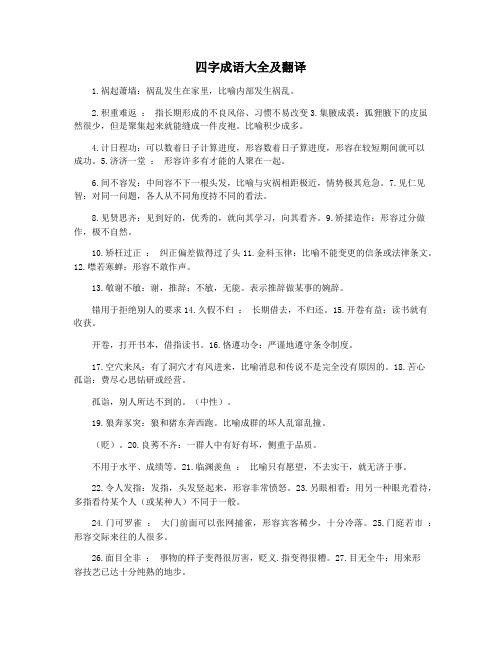
四字成语大全及翻译1.祸起萧墙:祸乱发生在家里,比喻内部发生祸乱。
2.积重难返:指长期形成的不良风俗、习惯不易改变3.集腋成裘:狐狸腋下的皮虽然很少,但是聚集起来就能缝成一件皮袍。
比喻积少成多。
4.计日程功:可以数着日子计算进度,形容数着日子算进度,形容在较短期间就可以成功。
5.济济一堂:形容许多有才能的人聚在一起。
6.间不容发:中间容不下一根头发,比喻与灾祸相距极近,情势极其危急。
7.见仁见智:对同一问题,各人从不同角度持不同的看法。
8.见贤思齐:见到好的,优秀的,就向其学习,向其看齐。
9.矫揉造作:形容过分做作,极不自然。
10.矫枉过正:纠正偏差做得过了头11.金科玉律:比喻不能变更的信条或法律条文。
12.噤若寒蝉:形容不敢作声。
13.敬谢不敏:谢,推辞;不敏,无能。
表示推辞做某事的婉辞。
错用于拒绝别人的要求14.久假不归:长期借去,不归还。
15.开卷有益:读书就有收获。
开卷,打开书本,借指读书。
16.恪遵功令:严谨地遵守条令制度。
17.空穴来风:有了洞穴才有风进来,比喻消息和传说不是完全没有原因的。
18.苦心孤诣:费尽心思钻研或经营。
孤诣,别人所达不到的。
(中性)。
19.狼奔豕突:狼和猪东奔西跑。
比喻成群的坏人乱窜乱撞。
(贬)。
20.良莠不齐:一群人中有好有坏,侧重于品质。
不用于水平、成绩等。
21.临渊羡鱼:比喻只有愿望,不去实干,就无济于事。
22.令人发指:发指,头发竖起来,形容非常愤怒。
23.另眼相看:用另一种眼光看待,多指看待某个人(或某种人)不同于一般。
24.门可罗雀:大门前面可以张网捕雀,形容宾客稀少,十分冷落。
25.门庭若市:形容交际来往的人很多。
26.面目全非:事物的样子变得很厉害,贬义.指变得很糟。
27.目无全牛:用来形容技艺已达十分纯熟的地步。
(褒义词)28.沐猴而冠:沐猴戴帽子,装成人的样子。
比喻装扮得像个人物,而实际并不像。
29.暮鼓晨钟:比喻可以使人警觉醒悟的话。
30.南辕北辙:心里想往南去,车子却往北走。
常用的四字成语及翻译【三篇】
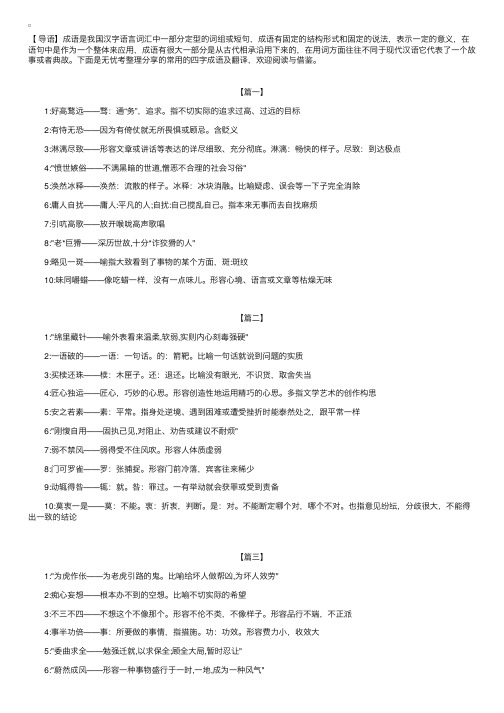
【导语】成语是我国汉字语⾔词汇中⼀部分定型的词组或短句,成语有固定的结构形式和固定的说法,表⽰⼀定的意义,在语句中是作为⼀个整体来应⽤,成语有很⼤⼀部分是从古代相承沿⽤下来的,在⽤词⽅⾯往往不同于现代汉语它代表了⼀个故事或者典故。
下⾯是⽆忧考整理分享的常⽤的四字成语及翻译,欢迎阅读与借鉴。
【篇⼀】 1:好⾼鹜远——骛:通“务”,追求。
指不切实际的追求过⾼、过远的⽬标 2:有恃⽆恐——因为有倚仗就⽆所畏惧或顾忌。
含贬义 3:淋漓尽致——形容⽂章或讲话等表达的详尽细致、充分彻底。
淋漓:畅快的样⼦。
尽致:到达极点 4:"愤世嫉俗——不满⿊暗的世道,憎恶不合理的社会习俗" 5:涣然冰释——涣然:流散的样⼦。
冰释:冰块消融。
⽐喻疑虑、误会等⼀下⼦完全消除 6:庸⼈⾃扰——庸⼈:平凡的⼈;⾃扰:⾃⼰搅乱⾃⼰。
指本来⽆事⽽去⾃找⿇烦 7:引吭⾼歌——放开喉咙⾼声歌唱 8:"⽼*巨猾——深历世故,⼗分*诈狡猾的⼈" 9:略见⼀斑——喻指⼤致看到了事物的某个⽅⾯,斑:斑纹 10:味同嚼蜡——像吃蜡⼀样,没有⼀点味⼉。
形容⼼境、语⾔或⽂章等枯燥⽆味【篇⼆】 1:"绵⾥藏针——喻外表看来温柔,软弱,实则内⼼刻毒强硬" 2:⼀语破的——⼀语:⼀句话。
的:箭靶。
⽐喻⼀句话就说到问题的实质 3:买椟还珠——椟:⽊匣⼦。
还:退还。
⽐喻没有眼光,不识货,取舍失当 4:匠⼼独运——匠⼼,巧妙的⼼思。
形容创造性地运⽤精巧的⼼思。
多指⽂学艺术的创作构思 5:安之若素——素:平常。
指⾝处逆境、遇到困难或遭受挫折时能泰然处之,跟平常⼀样 6:"刚愎⾃⽤——固执⼰见,对阻⽌、劝告或建议不耐烦" 7:弱不禁风——弱得受不住风吹。
形容⼈体质虚弱 8:门可罗雀——罗:张捕捉。
形容门前冷落,宾客往来稀少 9:动辄得咎——辄:就。
咎:罪过。
⼀有举动就会获罪或受到责备 10:莫衷⼀是——莫:不能。
汉语成语的翻译
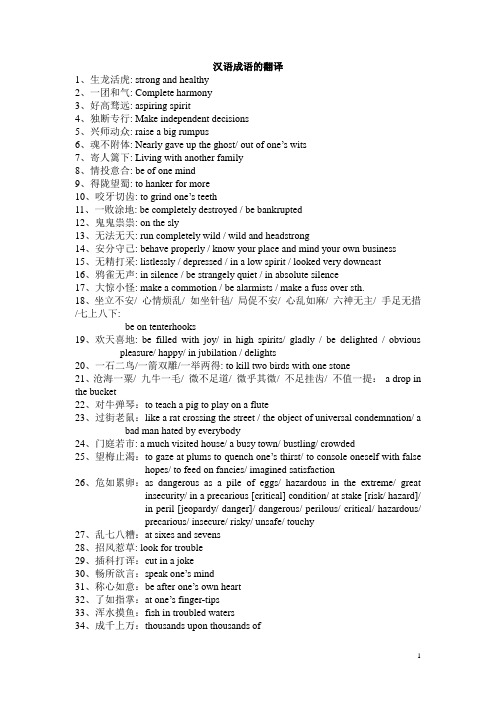
汉语成语的翻译1、生龙活虎: strong and healthy2、一团和气: Complete harmony3、好高骛远: aspiring spirit4、独断专行: Make independent decisions5、兴师动众: raise a big rumpus6、魂不附体: Nearly gave up the ghost/ out of one’s wits7、寄人篱下: Living with another family8、情投意合: be of one mind9、得陇望蜀: to hanker for more10、咬牙切齿: to grind one’s teeth11、一败涂地: be completely destroyed / be bankrupted12、鬼鬼祟祟: on the sly13、无法无天: run completely wild / wild and headstrong14、安分守己: behave properly / know your place and mind your own business15、无精打采: listlessly / depressed / in a low spirit / looked very downcast16、鸦雀无声: in silence / be strangely quiet / in absolute silence17、大惊小怪: make a commotion / be alarmists / make a fuss over sth.18、坐立不安/ 心情烦乱/ 如坐针毡/ 局促不安/ 心乱如麻/ 六神无主/ 手足无措/七上八下:be on tenterhooks19、欢天喜地: be filled with joy/ in high spirits/ gladly / be delighted / obviouspleasure/ happy/ in jubilation / delights20、一石二鸟/一箭双雕/一举两得: to kill two birds with one stone21、沧海一粟/ 九牛一毛/ 微不足道/ 微乎其微/ 不足挂齿/ 不值一提:a drop in the bucket22、对牛弹琴:to teach a pig to play on a flute23、过街老鼠:like a rat crossing the street / the object of universal condemnation/ abad man hated by everybody24、门庭若市: a much visited house/ a busy town/ bustling/ crowded25、望梅止渴:to gaze at plums to quench one’s thirst/ to console oneself with falsehopes/ to feed on fancies/ imagined satisfaction26、危如累卵:as dangerous as a pile of eggs/ hazardous in the extreme/ greatinsecurity/ in a precarious [critical] condition/ at stake [risk/ hazard]/in peril [jeopardy/ danger]/ dangerous/ perilous/ critical/ hazardous/precarious/ insecure/ risky/ unsafe/ touchy27、乱七八糟:at sixes and sevens28、招风惹草: look for trouble29、插科打诨:cut in a joke30、畅所欲言:speak one’s mind31、称心如意:be after one’s own heart32、了如指掌:at one’s finger-tips33、浑水摸鱼:fish in troubled waters34、成千上万:thousands upon thousands of35、水深火热:in deep water36、嗤之以鼻:turn up one’s nose at37、皮包骨头:skin and bones38、一触即发:touch and go39、一生一世:from the cradle to the grave40、一语道破:hit the nail on the head41、充耳不闻:turn a deaf ear to42、出人头地:be head and shoulders above others43、吹毛求疵:pick a hole in sb’s coat44、破釜沉舟:burn one’s boat45、大惊小怪:make a fuss about46、大海捞针:look for a needle in a bundle of hay47、颠倒黑白:talk black in to white48、得意忘形:have one’s nose in the air49、攀龙附凤:worship the rising sun50、大发雷霆:hit the ceiling/ fly into a rage51、骑虎难下:hold a wolf by the ears52、视而不见:turn a blind eye to53、三思而后行:look before you leap54、趁热打铁:make hay while the sun shines55、半信半疑: take sth with a grain of salt56、锦囊妙计: get an ace up one’s sleeve57、赴汤蹈火: go through fire and flood58、福星高照: have a lucky star above you59、进退维谷: be between the devil and the deep sea60、咎由自取: reap what he has sown61、口蜜腹剑: be fair without but foul within62、伶牙俐齿: have a ready tongue63、梁上君子: the light-fingered gentry64、每况愈下: be on the downgrade65、迷人眼目: throw dust into the eye of the public66、摩拳擦掌: roll up one’s sleeves67、全力以赴: do one’s level best68、忍气吞声: swallow the insult69、走投无路: come to the end of one’s tether70、游手好闲: eating the bread of idleness71、引狼入室: set the wolf to keep the sheep72、信口开河: shoot off one’s mouth73、一窍不通:not know the first thing of sth.74、扪心自问:Search one’s heart75、美中不足:a fly in the ointment76、自作自受: give sb. rope to hang oneself77、勾心斗角: put spokes in the other’s wheels78、杀气腾腾: make vicious attacks79、厚此薄彼: make fish of one and flesh of another80、得意洋洋: walk on air81、鸡毛蒜皮:trifling82、开门见山: come straight to the point83、狗急跳墙: do sth. desperate84、顺手牵羊: walk off with sth.85、守株待兔: trust to chance and stoke of luck86、铜墙铁壁: an impregnable fortress87、唇枪舌剑: engage in a battle of words88、黔驴技穷: at one’s end89、单枪匹马: all by oneself90、生龙活虎:bursting with energy91、见异思迁:a rolling stone92、苦苦哀求:be on one’s knees93、惹是生非: wake a sleeping dog94、毛骨悚然:be horror-stricken95、不屈不挠:indomitable96、班门弄斧:show off in the presence of an expert97、大刀阔斧:be bold and resolute98、故步自封:narrow-minded conservatism99、夜郎自大:ignorant boasting100、鸡犬不宁:be in great disorder101、汗马功劳:outstanding military exploits102、目瞪口呆:be stunned103、盘根错节:be too complicated104、三言两语:to explain clearly in a few words105、棋逢对手:be well-matched106、犬马之劳:work faithfully107、三心二意:be wavering108、雪中送炭:offering timely help109、血肉相连:maintain the closest relations with110、七上八下:be in a turmoil111、饱食终日:be content to eat three square meals a day and do nothing 112、叶公好龙:Lord Ye who professed to love dragons113、南柯一梦:sth vanished like a dream114、愣头愣脑:be somewhat rash in the head115、举目无亲:be entirely on your own116、毛遂自荐/ 自告奋勇:volunteer117、洗心革面、脱胎换骨:turn over a new leaf118、过河拆桥、忘恩负义:kick down the ladder119、专心致志、聚精会神:devote one’s full attention to120、陈词滥调:old stuff/ cliche121、痴心妄想:wishful thinking / fond dream122、长篇大论: a ponderous thesis / a lengthy speech [article]123、粗心大意:careless / negligent124、丰功伟绩:great [magnificent] contributions125、灵丹妙药:miraculous cure / heal-all126、自以为是、夜郎自大:self-conceited / arrogant 127、以怨报德、恩将仇报:return kindness with ingratitude 128、低三下四、奴颜婢膝:humble oneself129、宽宏大量、既往不咎:forgive and forget130、工于心计、唯利是图:be calculating and mercenary 131、意志坚强:tough-minded132、自私自利:be egotistic133、忠心耿耿:with loyalty and devotion134、死心塌地:die-hard135:、坚忍不拔:firm and indomitable136、顽固不化:be incorrigibly obstinate137、别具匠心:show one’s ingenuity138、别出心裁:try to be different139、招摇撞骗:swindle and bluff140、足智多谋:wise and resourceful141、仪态万方:appeared in all one’s glory142、丑态百出:act like a buffoon143、诡计多端:have a whole bag of tricks144、毋庸置疑:it is beyond doubt145、欢天喜地:be in the seventh heaven146、精力充沛:be in full of beans147、空中楼阁:castle in the air148、晴天霹雳:a bolt from the blue149、正中下怀:after one’s own heart150、毛发倒竖:one’s hair stands on end151、一箭双雕:kill two birds with one stone152、露出马脚:show the cloven hoof153、千钧一发:hang by a hair154、杀鸡取卵:kill the goose that lays the golden eggs 155、别有用心:have an axe to grind156、胡言论语:talk through one’s hat157、家徒四壁:to be as poor as Job158、不伦不类:neither fish nor fowl159、一视同仁:no respecter of persons160、千方百计:leave no stone unturned161、偷偷摸摸:hole and corner162、半斤八两:six of one and half a dozen of the other 163、九死一生:by the skin of one’s teeth164、直言不讳:call a spade a spade165、缘木求鱼:make a wild-goose chase166、钻冰求酥:hold a candle to the sun167、以冰致蝇:catch at shadows168、以狸饵鼠:lash the waves189、隔靴搔痒:beat the air190、打草惊蛇:wake a sleeping dog/ to stir up the grass and alert the snake191、易如反掌:as easy as falling off a log / to be as easy as turning over one’s hand 192、挥金如土:to spend money like dirt / spend money like water193、画蛇添足:paint the lily / to draw a snake and add feet to it194、掌上明珠:the apple of one’s eye / a pearl in the palm195、声东击西:to shout in the east and strike in the west196、刻骨铭心:to be engraved on one’s heart and bones197、井底之蛙:to be like a frog at the bottom of a well198、扬眉吐气:to feel proud and elated199、灯红酒绿:dissipated and luxurious200、纸醉金迷:(a life of ) luxury and dissipation一些时间的换形译法:1、三个月内:in a quarter of a year2、二十年的时间:two decades3、一百年前: a century ago4、二十五年前: a quarter of a century ago5、三月上旬:in the first ten days of March6、十八(架飞机):a dozen and a half airplanes7、一位耄耋老人:an old man of over eighty years old8、八十七年前:fourscore and seven years ago9、年逾花甲:over sixty years old10、年过七旬:over seventy years old11、古稀之年:in the years of seventy12、而立之年:thirty years old13、不惑之年:over forty years old14、本世纪初二十五年:the first quarter of this century15、过去的十年间:in the last decade16、三十位学生:one and a half score of students17、两个星期: a fortnight18、五百年来:five centuries19、一个该题时代的儿童:a two or three years old child20、黄口小儿: a under ten years old boy21、一个金钗之年的少女:a twelve years old girl22、她正值豆蔻年华:She is in the year of thirteen or fourteen.23、他已近加冠之年:He is going to be twenty years old now.24、他英年早逝:He died of about thirty-five years old.25、她已进了开六的年纪:She is fifty-one years old.。
成语翻译大全
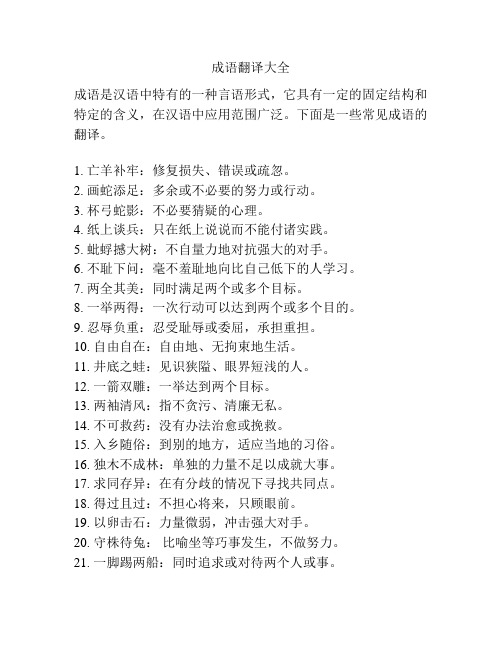
成语翻译大全成语是汉语中特有的一种言语形式,它具有一定的固定结构和特定的含义,在汉语中应用范围广泛。
下面是一些常见成语的翻译。
1. 亡羊补牢:修复损失、错误或疏忽。
2. 画蛇添足:多余或不必要的努力或行动。
3. 杯弓蛇影:不必要猜疑的心理。
4. 纸上谈兵:只在纸上说说而不能付诸实践。
5. 蚍蜉撼大树:不自量力地对抗强大的对手。
6. 不耻下问:毫不羞耻地向比自己低下的人学习。
7. 两全其美:同时满足两个或多个目标。
8. 一举两得:一次行动可以达到两个或多个目的。
9. 忍辱负重:忍受耻辱或委屈,承担重担。
10. 自由自在:自由地、无拘束地生活。
11. 井底之蛙:见识狭隘、眼界短浅的人。
12. 一箭双雕:一举达到两个目标。
13. 两袖清风:指不贪污、清廉无私。
14. 不可救药:没有办法治愈或挽救。
15. 入乡随俗:到别的地方,适应当地的习俗。
16. 独木不成林:单独的力量不足以成就大事。
17. 求同存异:在有分歧的情况下寻找共同点。
18. 得过且过:不担心将来,只顾眼前。
19. 以卵击石:力量微弱,冲击强大对手。
20. 守株待兔:比喻坐等巧事发生,不做努力。
21. 一脚踢两船:同时追求或对待两个人或事。
22. 半途而废:半天工夫就中途停止。
23. 深思熟虑:思考深入,考虑成熟。
24. 追求卓越:追求非凡的高标准和卓越的成就。
25. 热爱劳动:对劳动充满热情和热爱。
26. 明察秋毫:洞察事理、明察秋毫。
27. 不伦不类:既不属于一类又不属于另一类。
28. 进退两难:面临抉择,无论怎么选择都有困难。
29. 独树一帜:有自己独特的风格或表现。
30. 胸有成竹:在做某事前已有周密的计划和准备。
这只是一部分常见成语的翻译,希望对你有所帮助。
简单四字成语及解释大全
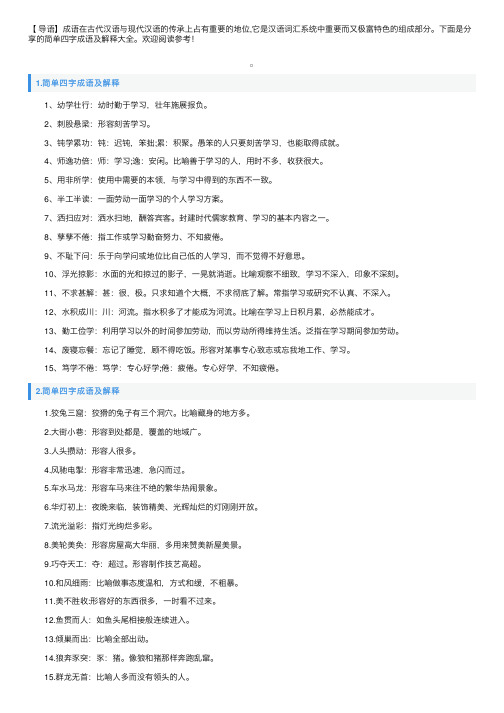
【导语】成语在古代汉语与现代汉语的传承上占有重要的地位,它是汉语词汇系统中重要⽽⼜极富特⾊的组成部分。
下⾯是分享的简单四字成语及解释⼤全。
欢迎阅读参考!1.简单四字成语及解释 1、幼学壮⾏:幼时勤于学习,壮年施展报负。
2、刺股悬梁:形容刻苦学习。
3、钝学累功:钝:迟钝,笨拙;累:积聚。
愚笨的⼈只要刻苦学习,也能取得成就。
4、师逸功倍:师:学习;逸:安闲。
⽐喻善于学习的⼈,⽤时不多,收获很⼤。
5、⽤⾮所学:使⽤中需要的本领,与学习中得到的东西不⼀致。
6、半⼯半读:⼀⾯劳动⼀⾯学习的个⼈学习⽅案。
7、洒扫应对:洒⽔扫地,酬答宾客。
封建时代儒家教育、学习的基本内容之⼀。
8、孳孳不倦:指⼯作或学习勤奋努⼒、不知疲倦。
9、不耻下问:乐于向学问或地位⽐⾃⼰低的⼈学习,⽽不觉得不好意思。
10、浮光掠影:⽔⾯的光和掠过的影⼦,⼀晃就消逝。
⽐喻观察不细致,学习不深⼊,印象不深刻。
11、不求甚解:甚:很,极。
只求知道个⼤概,不求彻底了解。
常指学习或研究不认真、不深⼊。
12、⽔积成川:川:河流。
指⽔积多了才能成为河流。
⽐喻在学习上⽇积⽉累,必然能成才。
13、勤⼯俭学:利⽤学习以外的时间参加劳动,⽽以劳动所得维持⽣活。
泛指在学习期间参加劳动。
14、废寝忘餐:忘记了睡觉,顾不得吃饭。
形容对某事专⼼致志或忘我地⼯作、学习。
15、笃学不倦:笃学:专⼼好学;倦:疲倦。
专⼼好学,不知疲倦。
2.简单四字成语及解释 1.狡兔三窟:狡猾的兔⼦有三个洞⽳。
⽐喻藏⾝的地⽅多。
2.⼤街⼩巷:形容到处都是,覆盖的地域⼴。
3.⼈头攒动:形容⼈很多。
4.风驰电掣:形容⾮常迅速,急闪⽽过。
5.车⽔马龙:形容车马来往不绝的繁华热闹景象。
6.华灯初上:夜晚来临,装饰精美、光辉灿烂的灯刚刚开放。
7.流光溢彩:指灯光绚烂多彩。
8.美轮美奂:形容房屋⾼⼤华丽,多⽤来赞美新屋美景。
9.巧夺天⼯:夺:超过。
形容制作技艺⾼超。
汉语成语英语翻译分享
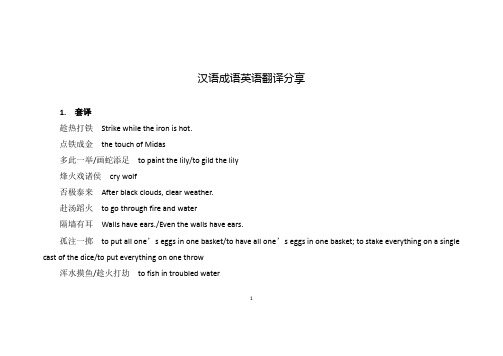
汉语成语英语翻译分享1.套译趁热打铁Strike while the iron is hot.点铁成金the touch of Midas多此一举/画蛇添足to paint the lily/to gild the lily烽火戏诸侯cry wolf否极泰来After black clouds, clear weather.赴汤蹈火to go through fire and water隔墙有耳Walls have ears./Even the walls have ears.孤注一掷to put all one’s eggs in one basket/to have all one’s eggs in one basket; to stake everything on a single cast of the dice/to put everything on one throw浑水摸鱼/趁火打劫to fish in troubled water1捡了芝麻,丢了西瓜。
/小事精明,大事糊涂。
Penny wise, pound foolish.见树不见林can’t see the wood for the trees空中楼阁castles in the air了如指掌to have something at one’s fingers’ends/to have something at one’s finger ends/have (or get) something at one’s fingertips (or finger tips)/to know something like the palm of one’s hand/to know something or someone like a book/as a person knows his ten fingers没做亏心事,不怕鬼叫门。
经典四字成语及解释大全集
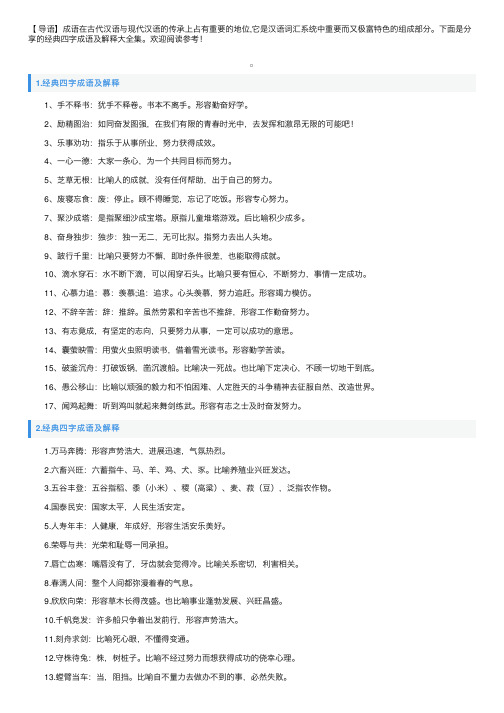
【导语】成语在古代汉语与现代汉语的传承上占有重要的地位,它是汉语词汇系统中重要⽽⼜极富特⾊的组成部分。
下⾯是分享的经典四字成语及解释⼤全集。
欢迎阅读参考!1.经典四字成语及解释 1、⼿不释书:犹⼿不释卷。
书本不离⼿。
形容勤奋好学。
2、励精图治:如同奋发图强,在我们有限的青春时光中,去发挥和激昂⽆限的可能吧! 3、乐事劝功:指乐于从事所业,努⼒获得成效。
4、⼀⼼⼀德:⼤家⼀条⼼,为⼀个共同⽬标⽽努⼒。
5、芝草⽆根:⽐喻⼈的成就,没有任何帮助,出于⾃⼰的努⼒。
6、废寝忘⾷:废:停⽌。
顾不得睡觉,忘记了吃饭。
形容专⼼努⼒。
7、聚沙成塔:是指聚细沙成宝塔。
原指⼉童堆塔游戏。
后⽐喻积少成多。
8、奋⾝独步:独步:独⼀⽆⼆,⽆可⽐拟。
指努⼒去出⼈头地。
9、跛⾏千⾥:⽐喻只要努⼒不懈,即时条件很差,也能取得成就。
10、滴⽔穿⽯:⽔不断下滴,可以闹穿⽯头。
⽐喻只要有恒⼼,不断努⼒,事情⼀定成功。
11、⼼慕⼒追:慕:羡慕;追:追求。
⼼头羡慕,努⼒追赶。
形容竭⼒模仿。
12、不辞⾟苦:辞:推辞。
虽然劳累和⾟苦也不推辞,形容⼯作勤奋努⼒。
13、有志竟成,有坚定的志向,只要努⼒从事,⼀定可以成功的意思。
14、囊萤映雪:⽤萤⽕⾍照明读书,借着雪光读书。
形容勤学苦读。
15、破釜沉⾈:打破饭锅,凿沉渡船。
⽐喻决⼀死战。
也⽐喻下定决⼼,不顾⼀切地⼲到底。
16、愚公移⼭:⽐喻以顽强的毅⼒和不怕困难、⼈定胜天的⽃争精神去征服⾃然、改造世界。
17、闻鸡起舞:听到鸡叫就起来舞剑练武。
形容有志之⼠及时奋发努⼒。
2.经典四字成语及解释 1.万马奔腾:形容声势浩⼤,进展迅速,⽓氛热烈。
2.六畜兴旺:六蓄指⽜、马、⽺、鸡、⽝、⾗。
⽐喻养殖业兴旺发达。
3.五⾕丰登:五⾕指稻、⿉(⼩⽶)、稷(⾼粱)、麦、菽(⾖),泛指农作物。
4.国泰民安:国家太平,⼈民⽣活安定。
5.⼈寿年丰:⼈健康,年成好,形容⽣活安乐美好。
6.荣辱与共:光荣和耻辱⼀同承担。
汉语成语的英文翻译

汉语成语的英文翻译1. 铁石心肠cruel and unrelenting2. 置死地于后生 a vigorous and manly exertion3. 千秋功业a great undertaking of lasting importance4. 安居乐业live in peace and work happily5. 骨肉分离family separation6. 各得其所be properly provided for7. 众议纷纭disagree on8. 岁月不居,来日苦短Time does not stay is brief is the day.9. 夜长梦多A long delay may mean trouble.10. 时不我与Time and tide wait for no man.11. 依时顺势keep up with the tide12. 日渐没落being pushed out of business13. 鹬蚌相争play A off against B14. 浩然之气noble spirit15. 凤毛麟角a rarity of the rarities16. 望而生畏stand in awe before17. 敬而远之keep respectfully aloof from18. 众矢之的in the dock19. 毫无瓜葛be divorced from20. 尔虞我诈sheer cunning and falsehood21. 备受推崇be rewarded and respected22. 善有善报,恶有恶报the good inevitably is successful and the bad inevitably punished23. 其乐融融sweetness and light24. 义无反顾feel obliged to25. 物美价廉attractive in price and quality26. 源源不断keep flowing in a steady stream27. 滚滚不息pour into28. 福祉well-being29. 精华quintessence30. 阴霾specter31. 势不两立pit sth against sth32. 打折扣wear thin / water down33. 大展宏图score big points34. 重整旗鼓shock sth back to life35. 不谋而合coincide with36. 染指dip one’s finger in37. 博大精深both extensive and profound38. 源远流长long-standing and well-established39. 诸子百家the masters’hundred schools40. 天下为公All under heaven are equal.41. 天下兴亡,匹夫有责Everybody is responsible for the fate of his country.42. 吃苦耐劳bear hardships43. 勤俭持家frugality in household management44. 尊师重教respect teachers and value education45. 当务之急highest priority46. 遭受重创take a heavy toll47. 先见之明prescient move48. 奇园古宅exotic gardens and old mansions49. 衣食住行clothing, food, shelter and transportation50. 信誓旦旦be poised to。
汉语常用成语英文翻译
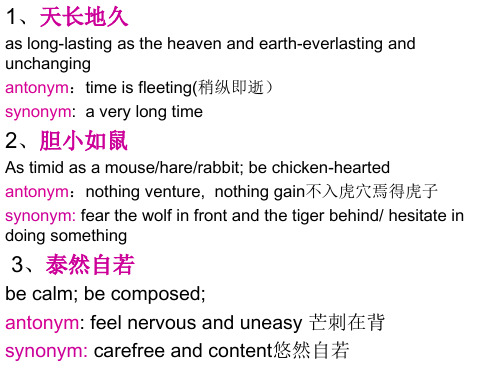
11、泪如泉涌 泪如泉涌
• tears flowing down like a spring; tears welling up in one’s eyes; tears pouring down one’s face antonym:belly laugh;horselaugh synonym :have one's face covered with tears
15、孤注一掷 、
stake all on one cast of the dice; risk everything on a single venture synonym: put all the eggs in one basket; antonym: burn one's boats; do or die; sink or swim
16. 纸上谈兵 engage in idle theorizing / 纸上谈兵: armchair strategy 17. 白费唇舌 waste one's breath/ to speak 白费唇舌: to the wind 18. 一文不名 be penniless/ without a 一文不名: penny to one’s name
• 29. 水落石出every thing comes to light • 30. 粗枝大叶careless/ with heavy hand • 31. 扬眉吐气standing up with one’s head up/ feeling with pride and elation • 32. 无孔不入get in by every corner/ seize every opportunity • 33. 大张旗鼓 on a large scale
文言文常用成语及翻译
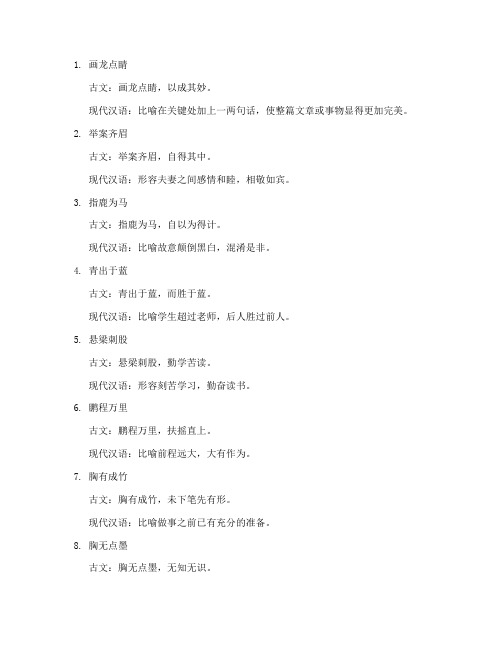
1. 画龙点睛古文:画龙点睛,以成其妙。
现代汉语:比喻在关键处加上一两句话,使整篇文章或事物显得更加完美。
2. 举案齐眉古文:举案齐眉,自得其中。
现代汉语:形容夫妻之间感情和睦,相敬如宾。
3. 指鹿为马古文:指鹿为马,自以为得计。
现代汉语:比喻故意颠倒黑白,混淆是非。
4. 青出于蓝古文:青出于蓝,而胜于蓝。
现代汉语:比喻学生超过老师,后人胜过前人。
5. 悬梁刺股古文:悬梁刺股,勤学苦读。
现代汉语:形容刻苦学习,勤奋读书。
6. 鹏程万里古文:鹏程万里,扶摇直上。
现代汉语:比喻前程远大,大有作为。
7. 胸有成竹古文:胸有成竹,未下笔先有形。
现代汉语:比喻做事之前已有充分的准备。
8. 胸无点墨古文:胸无点墨,无知无识。
现代汉语:形容人无知无识,没有学问。
9. 风马牛不相及古文:风马牛不相及,各自为政。
现代汉语:比喻事物之间毫无关联。
10. 一箭双雕古文:一箭双雕,一举两得。
现代汉语:比喻一举两得,一举两全。
11. 鸡鸣狗盗古文:鸡鸣狗盗,形容微不足道的小事。
现代汉语:比喻微不足道的小事。
12. 胸怀壮志古文:胸怀壮志,志向远大。
现代汉语:形容人有远大的志向和抱负。
13. 鹤立鸡群古文:鹤立鸡群,独树一帜。
现代汉语:比喻才能或仪表出众,与众不同。
14. 狐假虎威古文:狐假虎威,借势欺人。
现代汉语:比喻依仗别人的势力欺压人。
15. 老马识途古文:老马识途,经验丰富。
现代汉语:比喻经验丰富,能够指引方向。
这些成语不仅体现了文言文的魅力,而且在我们日常生活中仍具有很高的实用价值。
通过学习这些成语,我们可以更好地理解和运用古文,同时也能丰富我们的语言表达。
四字成语翻译
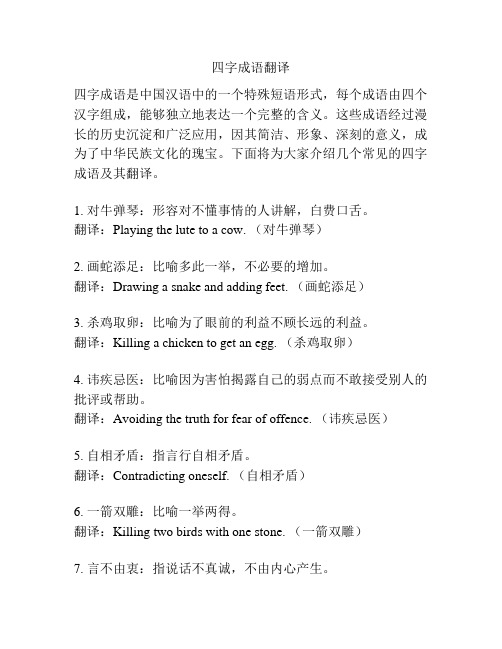
四字成语翻译四字成语是中国汉语中的一个特殊短语形式,每个成语由四个汉字组成,能够独立地表达一个完整的含义。
这些成语经过漫长的历史沉淀和广泛应用,因其简洁、形象、深刻的意义,成为了中华民族文化的瑰宝。
下面将为大家介绍几个常见的四字成语及其翻译。
1. 对牛弹琴:形容对不懂事情的人讲解,白费口舌。
翻译:Playing the lute to a cow. (对牛弹琴)2. 画蛇添足:比喻多此一举,不必要的增加。
翻译:Drawing a snake and adding feet. (画蛇添足)3. 杀鸡取卵:比喻为了眼前的利益不顾长远的利益。
翻译:Killing a chicken to get an egg. (杀鸡取卵)4. 讳疾忌医:比喻因为害怕揭露自己的弱点而不敢接受别人的批评或帮助。
翻译:Avoiding the truth for fear of offence. (讳疾忌医)5. 自相矛盾:指言行自相矛盾。
翻译:Contradicting oneself. (自相矛盾)6. 一箭双雕:比喻一举两得。
翻译:Killing two birds with one stone. (一箭双雕)7. 言不由衷:指说话不真诚,不由内心产生。
翻译:Insincere. (言不由衷)8. 无独有偶:表示不止一个相同或相似的事物出现。
翻译:A coincidence. (无独有偶)9. 心灵手巧:形容人聪明、灵活、善于动手。
翻译:Skillful and clever. (心灵手巧)10. 心旷神怡:心情开朗,神情愉快。
翻译:Feel cheerful and relaxed. (心旷神怡)以上是几个常见的四字成语及其简单的翻译。
这些四字成语通常蕴含着丰富的文化内涵和智慧,能够独特而形象地表达出一定的意义和价值观。
在汉语的日常使用中,四字成语经常被用来作为修辞手法,以增加表达的力度和美感。
因此,学习和了解四字成语对于汉语学习者来说是非常重要的。
- 1、下载文档前请自行甄别文档内容的完整性,平台不提供额外的编辑、内容补充、找答案等附加服务。
- 2、"仅部分预览"的文档,不可在线预览部分如存在完整性等问题,可反馈申请退款(可完整预览的文档不适用该条件!)。
- 3、如文档侵犯您的权益,请联系客服反馈,我们会尽快为您处理(人工客服工作时间:9:00-18:30)。
B.门庭若市 The courtyard is as crowded as a marketplace—a much visited house (literal+annotation) C. 一鼓作气 at the first drum courage is aroused (literal) at one fling/at a dash (free) (2)前人故事 前人故事 有些成语是由前人的故事来的,这类故事也是确 有其人其事,只是其人其事在历史上不是很重要的。 这类成语有的比较有风趣,有的有比较好的修辞效 果,所以也被人们广泛地使用 。
(6)人民群众用过的精炼词组 人民群众用过的精炼词组
成语中绝大部分是人民群众创造的,其中有一些 具有浓厚的口语色彩和生活气息。
A. 大海捞针 look for a needle in a bunch of haystack B. 指桑骂槐 point at the mulberry and abuse the locust—point at one but abuse another (literal +annotation) make oblique accusations (free)
(3)寓言传说 寓言传说
古书里边也有些含义深刻的寓言,也是成语的来 源。这类成语,往往有教训或讽喻的意味。 A.杞人忧天
like the man of Qi who was haunted by the fear that the sky might fall—entertain imaginary or groudless fears (literal+annotation) B.邯郸学步 imitate others and thus lose one’s own individuality/ imitate others without success and thus lose what used to be one’s own ability 守株待兔, 刻舟求剑, 画蛇添足
成语是一种人们长期以来相沿习用的、 成语 具有固定的结构形式和完整的意义内容、 带有书面语色彩的固定短语。
2. Features (特征) 1).结构严整,对仗工整 (form) 2). 言简意赅,形象生动(sense) 3). 琅琅上口 ,易学易记(sound)
1).结构严整,对仗工整 (form) 结构严整, 结构严整 汉语成语结构紧密,一般不能任意变动词序, 抽换或增减其中的成分,具有结构的凝固性, 其形式以四字格居多。 三三两两 by twos and threes 才高八斗 of great erudition/have profound learning 2).言简意赅,形象生动(sense) 言简意赅,形象生动( 言简意赅 成语言词简练,可用来表达丰富的思想内涵 。 不可救药 beyond cure/hopeless
(4)古人原句 古人原句
成语里面有一些是全用古人语句而不作改动的。 A. 水落石出 (宋朝文学家苏轼的《赤壁赋》:“山高月小,水落 石出”“水落石出”本来是纯粹写景的文句,后代 用为成语,比喻真实的情况终于显露出来。) When the water subsides the rocks emerge—the whole thing comes to light. (literal+annotation) The truth is (or comes)out /the murder is out. (free) B. 一鸣惊人 (an obscure person) amaze the world with a single brilliant feat (literal) make one’s mark at the first shot/win popularity with the first work. (free)
(8)外来的成语 外来的成语 成语中也有来自外国的。如佛经里边的语 句和典故以及西方的典故、格言以及西洋著 作的汉文译本中的精炼语句等。 A.一尘不染 free of dust B.现身说法 advise sb. or explain sth. by using one’s own experience / take oneself as an example C.心花怒放 be wild with joy/be elated (free)
(5)截用或改易古人语句 截用或改易古人语句
有些成语是截用或者把古人的语句略加改变,然后使用的。 截用或改变的原因,主要是为了使其符合成语的结构形式。
A.舍生取义 舍生取义 (《孟子·告子》上篇里有两句话是:"生,亦我所欲 也;义,亦我所欲也。二者不可得兼,舍生而取义 者也。"后人从这两句话里,取出"舍生取义"这四个 字作为成语,表示为了维护正义不惜牺牲生命的崇 高品质。) lay down one’s life for a just cause die for principle/prefer honor to life (free) B. 一丘之貉 birds of a feather/tigers from the same den
4. Sources of Chinese Idioms (来源) (1)历史事实 历史事实 有些成语是从历史事实来的。其中有的是把 某一历史事件,概括为成语的;有的是截取 或改易历史里的著名文句为成语的。 A. 完璧归赵 return the jade intact to the State of Zhao—return sth. to its owner in good condition. (literal) retrun a thing whole to its 易学易记(sound) 汉语成语结构对仗工整,具有音韵美,读起来琅琅 上口,较易记住。 曲曲环环 twisting (free) 叮叮咚咚 murmuring (free) (1). 九溪十八涧则以“曲曲环环路,叮叮咚咚泉”著称。 The place called Nine Creeks and Eighteen Gullies is wellknown for its twisting paths and murmuring streams.
5. Methods to Translate Chinese Idioms (方法) 方法) 方法 1). Literal translation 直译(在语言形式和比喻形象
上有相似之处,虽所用比喻不同,但含义却较相似。 尽量在译文中保留原文成语的形象、修辞手段和民 族特色)
a. 打草惊蛇:to stir up the grass and alert the snake (wake a sleeping dog) b. 对牛弹琴:to play the lute to a cow (cast the pearl before the swine) c. 雪中送炭:to send charcoal in snowy weather
2) Literal translation with annotations直译加注有些习 直译加注
语含有比喻意义、象征意义或是历史典故等) 语含有比喻意义、象征意义或是历史典故等
a.木已成舟:The wood is already made into a boat—what’s done is done. b. 杞人忧天: Like the man of Chi who was haunted by the fear that the sky might fall—unnecessary anxiety. c . 朝秦暮楚: Serve the State of Qin in the morning and the State of Chu in the evening—playing fast and loose (quick to switch sides)
(7).谚语俗语 谚语俗语 有些成语是群众口头中使用的谚语或俗语。 A. 亡羊补牢 Mend the fold after the sheep is stolen. B. 敝帚千金 cherish an old broom as if it were a thousand pieces of gold—cherish a possession of little value.
d. 挥金如土: Spend money like dirt/water e. 易如反掌: As easy as turning over one’s hand/palm f. 攻其不备: Strike sb when he is unprepared g. 声东击西: Shout in the east and strike in the west h、顺水推舟: Push the boat with the current i、朴实无华: Simple and unadorned
画饼充饥 draw a cake and call it a dinner (literal) feed on illusions/eat the air (free) 抛砖引玉 cast a brick to attract jade/cast a brick to get a gem(literal) make a modest spur to induce others to come forward with valuable contributions (free) 扬扬得意 be immensely proud with success/look triumphant (free)
A.胸有成竹 have a well-thought-out plan before /have a card (or an ace) up one’s sleeve (free) B. 满城风雨 (news) spread all over the city / become the talk of the town (free) C.门可罗雀 You can catch sparrows on the doorstep—where visitors are few and far between. (literal+annotation) 威武不屈, 尾大不掉, 抱薪救火
